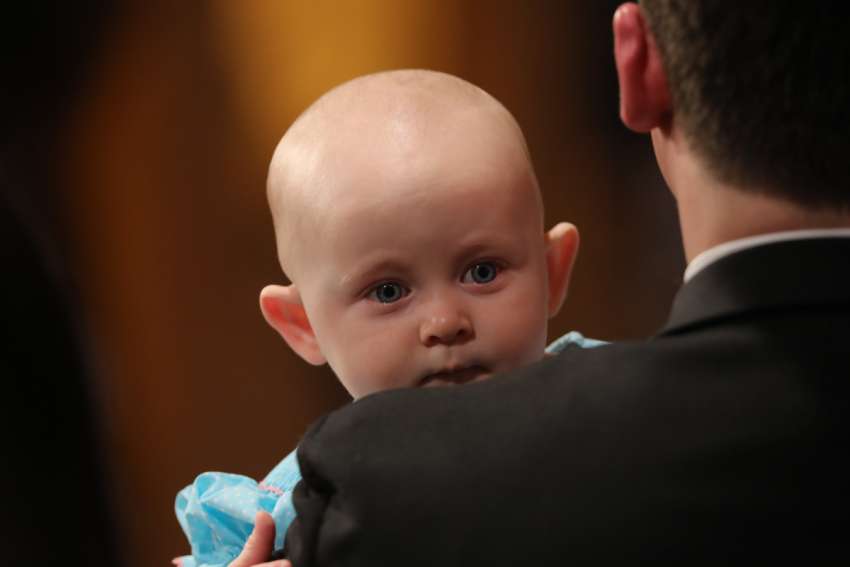Toddling off the population cliff
Saying the family is the basic building block of society was once a “motherhood and apple pie” sentiment. Motherhood and apple pie, being, of course, a cliché alluding to all that is both normal and good. We need a new cliché. Today motherhood itself is no longer “motherhood and apple pie.”
Half a quote is worse than none
I have always been frustrated by moments, especially in political speeches, where half a well-known adage is presented as proof of concept, completely ignoring the original context and the fuller saying. We see this often when someone cherry-picks part of a saying to prove their point but leaves out significant context that might disprove their argument as a whole.
True(r) stories lead us to divine truth
People are curious and beautiful and mysterious. One of the things I love most about humans is our capacity to make meaning. It is endlessly fascinating to me that many people can be in the same room, experiencing the same objective reality and come away with such beautifully different perspectives and subjective understandings of what has happened. We are all living in the stories of our lives, whether we acknowledge them or not.
Give God our hearts not Valentines
Ash Wednesday is on the horizon. While Catholics are getting ashes on our foreheads, much of the rest of the Western world will be buying chocolates and flowers. I don’t remember Ash Wednesday falling on Valentine’s Day previously. Google says the last time was in 1945, a little before my time.
- By Glen Argan
Replacing "Fiducia supplicans’" confusions with clarity
In the Jan. 21 edition of The Catholic Register, Roderick ‘Rory’ Mckay published the article “Fiducia supplicans a blessing for the Church.” I wish to respond to him and others who assert something that is patently false.
A call to end the arms trade
Each night when I was growing up, my mother would do “prayers & lullabies” with us. One prayer was to recite a simple passage from Scripture. I am quoting my “prayer-memory” here and not the actual Scripture:
This skier is not for turning
The hard part was sitting down properly on the T-bar ski lift, or rather not sitting down. If you sat down, the whole vertical pipe would swoop forward violently and dump you on your back in the middle of the track for the skier behind you to pierce you with their long skis. The object of the T-bar was to brace your knees in a slight crouching position, hang on to the pipe with your hands, and let the seat drag you to the upper altitudes by the back of your thighs. Whoever designed this lift deserved a sadistic engineer of the year award.
Ski hills don’t care that we are fallen
One winter when I was 13 and my brother was 14, we took a family trip to New Hampshire. To ski. Because my brother really wanted to. He promised he would teach me how to ski. My elderly dad, an avid outdoorsman and sports enthusiast, had never, however, in his long life, skied, and was wary of its potential dangers involving bone protrusions and close encounters with trees. He agreed to take us despite.
Laughter is God’s medicine for the world
As a humourist I have often asked myself if my lighter reflections were appropriate in a time of such deep division and grief. As a columnist for over 10 years, there have been times when I have wondered if I should change tack, focus on darker or more politically edgy work, addressing the catastrophes of our times. It is surely fair to ask if one’s lightness, at a time of dark, is fitting or even welcomed. Truth be told, I continue to be torn. Humour, I know, has had a role to play in every context since the beginning of time, as a mediating influence, a salve or as a weapon to address contentious topics.
Moving onward means accepting human limits
In his beautiful Apostolic Exhortation, “The Joy of the Gospel,” Pope Francis reminds us that as pastoral people we have to accept tension between fullness and limitation, and not be concerned with immediate results.
Living liturgically means living differently
In an article published in the National Post on Dec. 29, columnist Joseph Brean queried the meaning of the week between Christmas Day and New Year’s. It was a curious piece. Brean asked what the week is all about concluding that it is “this least wonderful time of the year (that) is either an under-appreciated winter interlude of nothingness, or a bland calendrical purgatory of suspended animation.”












